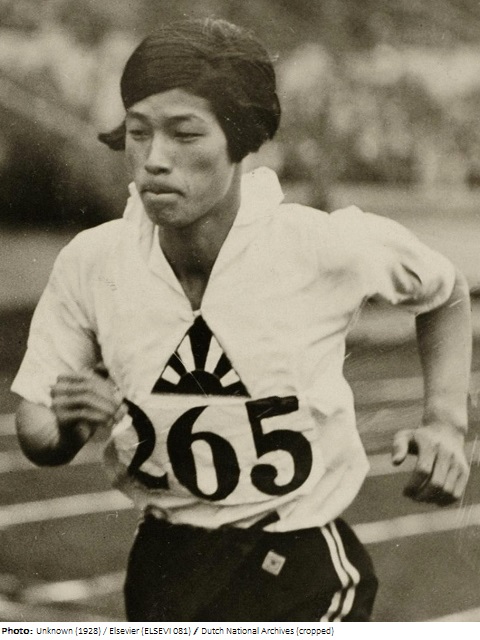Kinue Hitomi

Biographical information
| Roles | Competed in Olympic Games |
|---|---|
| Sex | Female |
| Full name | Kinue•Hitomi |
| Used name | Kinue•Hitomi |
| Original name | 人見•絹枝 |
| Born | 1 January 1907 in Fukuhama, Okayama, Okayama (JPN) |
| Died | 2 August 1931 in Osaka, Osaka (JPN) |
| Measurements | 157 cm / 45 kg |
| Affiliations | Japan Women's College of Physical Education, Setagaya (JPN) |
| NOC |  Japan Japan |
| Medals | OG |
| Gold | 0 |
| Silver | 1 |
| Bronze | 0 |
| Total | 1 |
Biography
Kinue Hitomi was born as the daughter of a wealthy farmer from the current city of Okayama. Although it was still unusual for girls to study, she advanced to the local senior high school, where girls were allowed to play tennis and volleyball, and Hitomi was successful in tennis at the high school level. After a successful début in athletics in 1923, she enrolled in Nikaido Gymnastics School the following year. Later that year, she won the triple jump and javelin throw with unofficial record marks.
After graduating Hitomi worked as a gymnastics teacher in Kyoto and in Taiwan, but then returned to Nikaido Gymnastics School, which was to become the Japan Women’s Physical Education College. She competed in the Meiji Jingu championships, winning both the 50 metre dash and the triple jump in two consecutive years, setting an unofficial world record of 11.62 in the triple jump. In 1926, she joined the Sports Division of the Osaka Mainichi Shimbun newspaper. In the following years she won nation-wide competitions in such different events as 100 metres, triple jump, baseball throw, and shot put, setting a Japanese record in the latter. In 1926, she was the only Japanese person to take part in the 2nd Women’s World Games in Göteberg, where she won the long jump with a world record of 5.50. She also won the standing long jump, placed second in the discus throw, and third in the 100 yard run and competed in the 60 and 250 metre runs. As a result, she not only received the Honorary Award of the Fédération Sportive Féminine Internationale (FSFI) but also earned valuable experiences regarding Western training techniques.
Hitomi continued to dominate women’s athletics in Japan, tying the world record in the 100 with 12.4. In October 1927 she took her first titles at the Japan Athletics Championships, in the 50 and 100 metres. In 1928, she set an unofficial world record of 59.0 for 400 metres. At the next national championships, she improved the 100 world record to 12.2 and set another one in the long jump with 5.98. At the AAA Women’s Championships in London, she clocked 25.8 in the 200, yet another world record.
At the 1928 Amsterdam Olympics Hitomi was the first Japanese female athlete to compete and her silver medal in the 800 made her the first Japanese female Olympic medalist. After another defeat at home in the 100 she retired, but returned in the spring of 1929 and continued to set Japanese records in various events and even a world record of 24.7 in the 200. At the end of 1929, she successfully took part in several international meetings while a German team toured the Far East. At the next Japanese Athletics Championships, she captured victories in the 200, long jump, and 4x100 relay, setting six Japanese records during the event.
In 1930 a fundraiser at girls’ schools allowed six athletes, including Hitomi, to represent Japan at the 3rd International Women’s Games at Praha. She took gold in the long jump, silver in the triathlon, and bronze in the 60 metres and javelin throw. With 13 individual points, she came in second in the overall individual standings. While still in Europe, the Japanese team and Hitomi took part in various meetings against European countries although she was sick and suffered from a high fever. Back in Japan, she immediately returned to work but had to be hospitalized for pleurisy in the Osaka Imperial University Hospital in March 1931. There, she eventually died from pneumonia exactly three years after winning the silver medal in Amsterdam.
During her short career, Hitomi set four official world records in three different events, two unofficial world records in events that were not official at the time (400, triple jump) and another four in events that are no longer on the international schedule (50 and 60 metres, standing long jump, triathlon). That is 10 world records altogether, in nine different events. All of her medals and trophies had been donated during World War II for metal recovery. Only the Olympic silver medal survived but was not discovered until 2000.
Personal Bests: 100 – 12.2 (1928); 800 – 2:17.6e (1928).
Results
| Games | Discipline (Sport) / Event | NOC / Team | Pos | Medal | As | |
|---|---|---|---|---|---|---|
| 1928 Summer Olympics | Athletics |  JPN JPN |
Kinue Hitomi | |||
| 100 metres, Women (Olympic) | 4 h2 r2/3 | |||||
| 800 metres, Women (Olympic) | 2 | Silver | ||||
| High Jump, Women (Olympic) | ||||||
| Discus Throw, Women (Olympic) |
Special Notes
- Listed in First Female Competitors at the Olympics by Country (First woman to compete for Japan)
- Listed in Olympians Who Won a Medal at the Women's World Games (3–2–3 1926 Göteborg gold: long jump and standing long jump, silver: discus throw, bronze: 100 yards; 1930 Praha gold: long jump, silver: triathlon, bronze: 60 m and javelin throw)